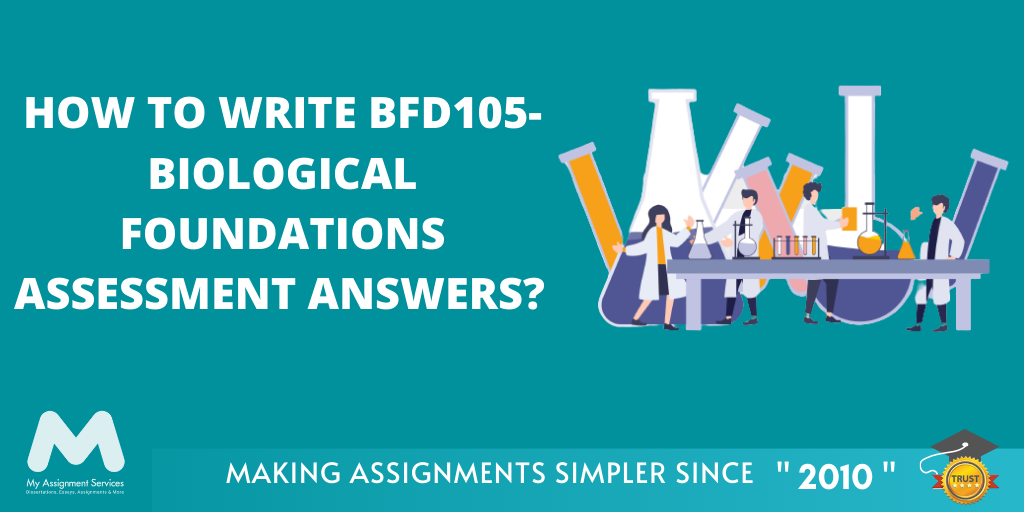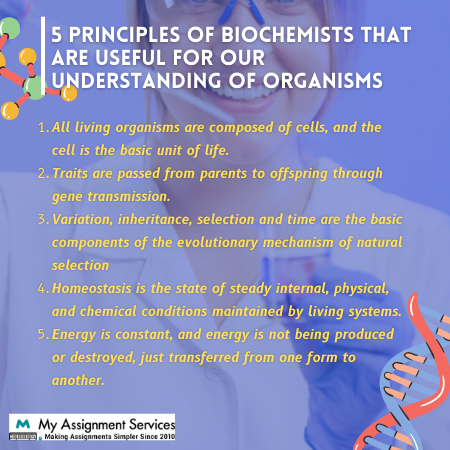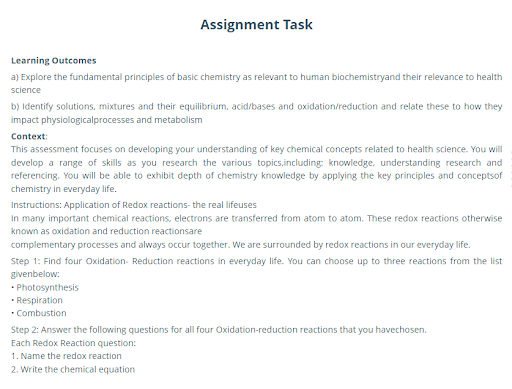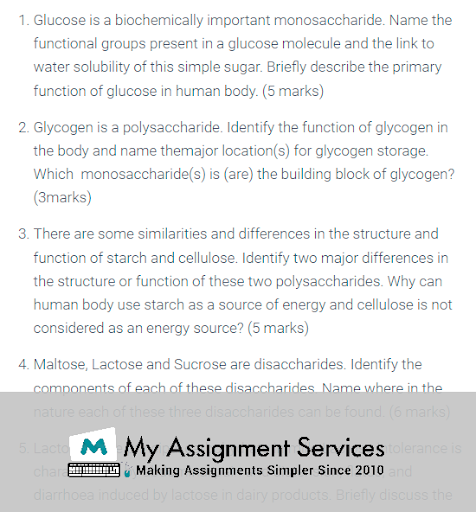
BFD105 focuses on developing your knowledge of fundamental chemical concepts associated with health science. This course explores a range of research skills on diverse chemistry topics to understand research and referencing methods. You will develop in-depth chemistry knowledge by using the fundamental principles of chemistry in day-to-day life.
All biological processes in nature and organisms are based on principles of physics and chemistry. So if you wish to understand the relationship between health and biochemistry, you first need to understand the fundamental principles of chemistry. Chemistry is an extensive field of science and is extensively used for understanding living organisms.
This unit consists of biochemistry which is a combination of biology and chemistry. You will come across various biology concepts - life sciences, life processes, cell theory, etc. in this unit. Also, chemistry concepts - include atom structure, exchange of electrons in a chemical reaction, and covalent and non-covalent bonds.
Biochemistry is significant in forensic studies because it allows criminologists to track down criminals using DNA samples; the very first person found guilty using DNA samples was not until 1988.
Writing assessment answers can be challenging as they are designed to help you understand and revise the course material. Read forth to get the assessment answers to the key concepts in BFD105 and Biological Foundations assessment samples.

What are the fundamental principles of basic chemistry relevant to human biochemistry and health science?
All organisms are made up of countless cells, and within those cells, numerous reactions occur every day. Chemistry is useful for understanding the interaction between various elements/fluids to their surroundings. Health sciences use chemistry to develop effective studies to improve our understanding of living organisms and enhance healthcare.
Here are a few basic concepts that help us understand human biochemistry better:
The elements of biochemistry
Organisms convert food into energy through chemical reactions; studying these elements is necessary for our understanding of health science. Similarly, biochemistry focuses on carrying out various chemical reactions efficiently.
Atomic structure and bonding
In chemistry, the fundamental unit of matter is an atom. The basic atomic structures knowledge and their interactions through covalent/non-covalent bonds help develop molecules and salts used to develop various daily-life products, especially medicinal drugs.
Delocalisation of electrons
Covalent bonds are formed due to the exchange of electrons between atoms. The science behind the exchange/delocalisation of electrons helps understand the various properties of chemical elements - density, melting/boiling point, atomic number, etc. It is a key concept for Biological Foundations assessment answers.
Non-covalent interactions
A covalent bond is formed by exchanging electrons with another atom, but it is called a nonpolar covalent bond when a bond is formed by sharing electrons. Such chemical bonds give another section of chemistry known as organic chemistry. Still, organic chemistry is useful for studying the DNA of organisms.
Did you know that Hydrogen particles were generated at the beginning of the universe, so every hydrogen particle in your body is potentially 13.5 billion years old?
These concepts in chemistry are useful for better understanding biochemistry and health sciences. Medical research and development require extensive chemistry input, and various biochemical reactions use the basic chemistry concepts you must know. So, here are the fundamental principles of basic chemistry relevant to human biochemistry and health science. You may refer to the attached Biological Foundations assessment samples.
Working through your assignments will require you to go through the various stages of researching, drafting, compiling your research papers, ect. It can get overwhelming to do everything and get science assignment help through free resources and affordable live guided sessions. Our experts can help you throughout the process of compiling your assignment. Enrol today!
Describe the structure and function of biochemical compounds?
Compounds made up of carbon and hydrogen that are exclusively found in living organisms are called biochemical compounds. These compounds are involved in every life process - growth, repair, respiration, digestion, etc. - that support the survival of living organisms. A few of such biochemical compounds are:
Carbohydrates
Made up of sugar and starch, these chemical compounds are made up of only three elements - carbon, hydrogen and oxygen. Carbohydrates provide energy to carry out all life functions, and a common example is glucose.
Lipids
Fatty acids and oils fall into this category of biochemical compounds. They contain hydrogen, carbon, oxygen and, in some cases, phosphorus. Lipids store chemical energy obtained from food. Lipids are naturally available in oils, butter and meat.
Proteins
These chemical compounds are one of the most important for life functions. Proteins mainly contain sulphur, nitrogen, oxygen, hydrogen, and carbon. The primary purpose of proteins is to repair and rejuvenate the cells. Protein sources include meat, eggs, etc.
Nucleic Acids
These are the building block of DNA and RNA. Nucleic acids are made up of oxygen, hydrogen, nitrogen and phosphorus. The prime function of nucleic acids is to structure and carry the evolutionary information from parent to offspring.
Eduard Buchner worked with ethanol fermentation in connection to cell lines derived from yeast in 1896, contributing to a better knowledge of living organisms' chemical interactions.
These biochemicals have one thing in common: they all contain carbs or carbohydrates, which makes life processes possible in the first place. The biochemical compounds are the building blocks of organisms and are responsible for the various life processes and their effectiveness. You might know of the importance of a balanced diet: it is to maintain a healthy level of these biochemicals. This does not completely cover all the topics but is a brief review of these concepts. Refer to the attached sample for more information.




Where can I get Biological Foundations Assessment samples?
We discussed a few of the most prominent Biological Foundations Assessment Answers. There are various other concepts in this unit that you'll learn, including workplace policies and procedures for hazard detection, accidental or arson fire emergencies and evacuation, accident investigation, and more.
These varied concepts might require you to go through various books and resources to find the assessment answers. You might be seeking answers to a specific question, and it can be a challenge to access the exact answer. Also, the questions posed in these samples may vary every year, so finding the relevant assignment answers in previous assignments is also challenging.
Graphite and Diamond are formed solely of carbon and contain no other elements.
You can enrol with us to get absolutely free of cost academic resources and sample solutions to help you compose your assignments. The task might require you to pursue case studies; if you seek help conducting or compiling a case study for the unit, get help from our academic experts.
Finding assessment answers can be a challenge as you may search for hours and end up without any useful resources. We offer a live guided session for students at affordable prices; you can enrol by filling out the enrollment form and connecting to one of our experts. It's that easy and accessible. Get science assignment help that doesn't compromise your learning experience; rather, upgrade it with our experts and score HD.
Related Study Materials
Our Experts can answer your Assignment questions instantly.
Ask Question0 Comment
Get It Done! Today
1,212,718Orders
4.9/5Rating
5,063Experts













Loved reading this Blog? Share your valuable thoughts in the comment section.
Add comment